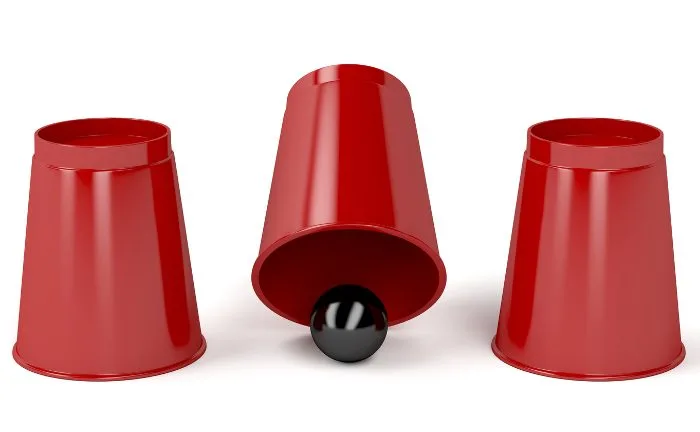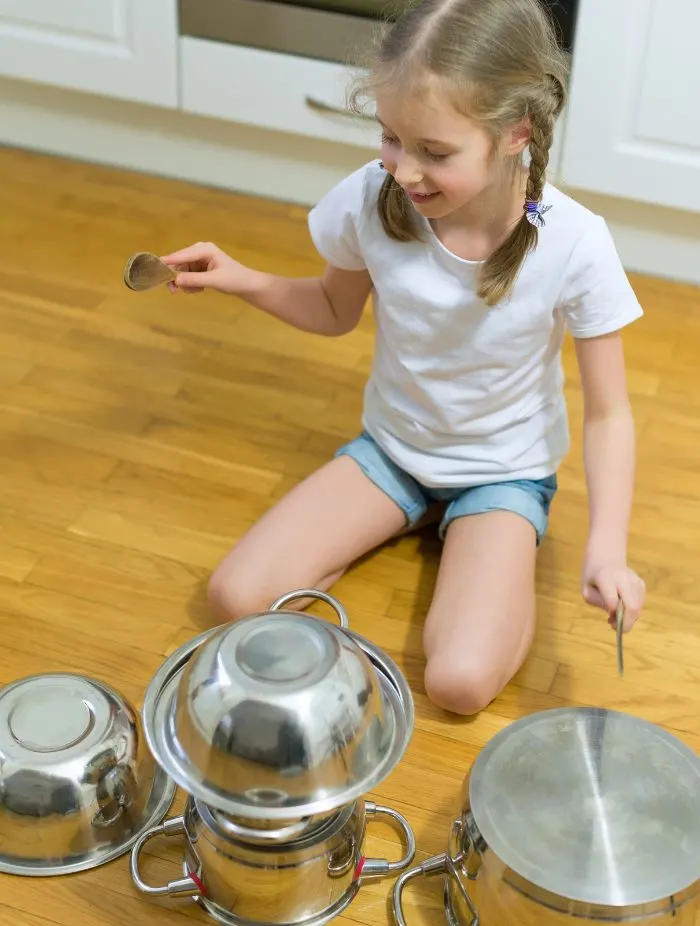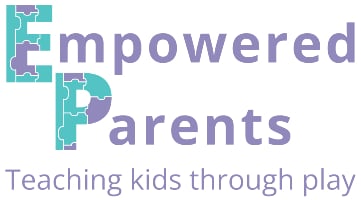Boost memory with these simple, fun memory games for kids. They are suitable for preschoolers and older children too.
The Benefits of Memory Games
Memory games generally work by improving working memory. Working memory is the information that you hold in your brain that you’re able to access straight away.
Having a strong working memory means you can retain information and apply it. Solving maths problem in your head or remembering the names of people you’ve just met are examples of working memory.
Children with strong working memories can focus on activities and retain information with accuracy.
In turn, they can follow instructions with more than one component, incorporate new information into their thinking, and then use their knowledge in a range of new, different scenarios.
All of these skills impact children’s cognitive development and ability to learn, both as preschoolers and throughout their lives.
At What Age Can Children Start Playing Memory Games?
Having good working memory skills helps children to access all areas of learning more easily. When children find it easy to learn they feel positive about learning, and about themselves. So good working memory skills can be transformative, laying a strong foundation for your child’s education journey.
Playing memory games from around 3 years old is effective, and most children at this age are able to concentrate for a slightly longer period of time and take turns.
Most games can be adapted to make them simpler if your child struggles with them initially.
9 Working Memory Games for Kids
Here are a few of my favourite memory games for children.
1. Matching Card Memory Games
Lots of matching card games are available on the market, often with popular children’s characters on them, so choose a set that will capture your children’s imagination.
How to play:
- Place the cards face down and spread them out. Each player tries to find a matching pair by turning up two cards.
- If they do not match, then the cards are put back in the same place, face down. If they do match, the player keeps them and gets to take another turn.
- When all the cards have been paired up, the player with the most pairs of cards is the winner.
This builds children’s memories by requiring them to take account of each picture and remember where it is placed.
If your child is particularly physical you could play this game on a larger scale with bigger pictures, placed around the room so you have to move back and forth to try to pair them up.
Encouraging physical activity plays into children’s natural way of learning; as children move they begin to file away and store their thoughts, which is ideal for developing memory.
(Get your own set of printable memory card games here!)
2. What’s on the Tray (aka Kim’s Game)
Kim’s Game is a classic early memory game used in many early childhood settings. It’s very simple to set up and can easily be done at home with items you have on hand.
How to play:
- Place objects on a tray, starting with around 4. These should be everyday items such as a comb, a key, a rock and a banana.
- Show the tray to your child and let them look at the objects, then cover the tray over and ask them to name the objects.
This builds up children’s ability to visualize and use visual memory skills.
To add interest to the game you can take an item away each time and ask them what is missing.
3. The Magic Cup Game
This game is also popular because it has a multitude of benefits, the most important of which is that it builds concentration which is necessary for improving memory.

How to play:
- Place 3 cups upside down and a small item such as a ball, figure or coin.
- The item is placed under one of the cups, the cups are moved around and the child has to watch them move and then show you which cup the item is under.
This can be made harder by adding more cups, moving them more quickly, or shuffling more. Your child may also like to switch roles and have a go at moving the cups for themselves.
4. Traffic Lights
Here’s one to get your child up and moving around.
How to play:
- At the park or in the yard, instruct your child that when you say “green light” they may run, when you say “red light” they must stop and when you say “amber light” they may walk.
- As your child becomes more adept at the Red Light, Green Light game you can add more instructions such as “roundabout” to get them to spin around, “flat tyre” for sitting down or “it’s raining” for windscreen wiper movements with the arms.
This helps to build memory by linking abstract instructions to physical movements. They have to remember both the command and what to do about it.
5. I Went to the Moon and I Took a….
This game is best played in a group setting with lots of different personalities adding to the list, but could also be played on a smaller scale around the dining table at home.
How to play:
- The first person to play starts the sentence, in this case, “I went to the moon and I took a…” and picks something they take with them such as a “teddy bear.”
- The next person must then repeat the first player’s phrase and add their own item e.g. “I went to the moon and I took a teddy bear and a flag.”
- Each player then adds another item and must recount the list prior to their turn.
This game can be played with a different starting sentence e.g. “I went to the shops and I bought” or “I went to the park and I…” so choose something that will appeal to your child.
The repetitive nature of the game helps build children’s memories as they recall the lists.
6. Drum Beats
This sound activity builds children’s listening skills which have a whole host of benefits for memory including exercising their auditory processing system and laying the foundation for recognizing different sounds as part of speech, which is important in learning to read and write.

How to play:
- Use drums, or upturned pots and pans, to play rhythms. One player “sends” the rhythm, by playing it on their drum, and the other must then send it back, by playing it on theirs.
- Take turns to come up with the rhythm.
7. Simon Says
Simon Says is a classic childhood game and a great way of building memory skills because it requires that children listen carefully and respond correctly, remembering and referencing a set of rules.
This careful listening is required to remember information that is given verbally and will pay long-term dividends as children will need to hear and remember verbal instructions throughout their schooling years.
How to play:
- Simon Says requires that your child only follow an instruction when preceded by the words “Simon says.”
- For example: “Simon says pat your head” should elicit a response whilst “pat your head” should not.
Here are 70 Simon Says commands to try.
8. In the River, On the Bank
Another game with large movement incorporated into it is the very simple, but effective, ‘In the River, On the Bank.’
How to play:
- Mark out an area using rope or tape that can serve as the river and have your child stand on the bank of the river by standing outside of the river area.
- The premise of the game is very simple – you will give instructions and your child will do the opposite.
- If you say “on the bank” your child will jump into the ‘river’ and if you say “in the river” your child will hop back up onto the bank.
This game seems very simple but it requires a great deal of processing and accessing the memory of the rules, great for developing strong working memory.
In order to play your child must remember which part is the river and which part is the bank, then remember to reverse the instructions and act accordingly.
9. Incorporate Technology
Many parents are wary of using technology and while limiting screen time is wise, technology is an important part of life and culture, and in small doses can be used to help children’s learning and development.

Studies have shown that technology is most effective in helping children to learn when they use it alongside a parent, teacher, or peer.
So, if you’d like to embrace technology then playing some of the memory games available for children together with your child will be beneficial for them.
There are plenty of apps to choose from so experiment with a few and see what works for you and your child.
Building strong working memory skills is so important to children’s ability to learn successfully so if you can incorporate a few of these memory games for children into your weekly routine then you will be able to give your child a headstart.


Andrew
Tuesday 12th of September 2023
Thanks for the list, just what I needed. I would love to have other lists of age appropriate brain exercising games. Anything from a simple memory game to a game like tic tac toe or connect 4.
Thank goodness for technology. The shell game is great, but I’m too slow for my 5 year olds, thankfully I can download an app and put it on the projector 😂
Tanja Mcilroy
Tuesday 12th of September 2023
Hi Andrew, there are lots of other activities on the website. Here are a few: https://empoweredparents.co/vocabulary-games-for-kids/, https://empoweredparents.co/word-games-to-play-in-the-car/, https://empoweredparents.co/how-to-develop-your-childs-thinking-skills-during-storytime/
Chi
Tuesday 1st of August 2023
This is a fabulous list of ideas to get us started! Thank you for creating this helpful tool 🙂
Tanja Mcilroy
Tuesday 8th of August 2023
Thanks for your comment, Chi!
Nikita
Tuesday 17th of August 2021
It was awesome n new thanks
Vibha jitendra pathak
Thursday 15th of July 2021
Excellent and it is v.useful for me as a teacher
Tanja Mcilroy
Friday 16th of July 2021
Thanks, Vibha. Glad this will be useful!
Lorraine Bird
Saturday 19th of September 2020
So important memory skills, us them for OT sessions
Tanja Mcilroy
Friday 25th of September 2020
Thanks for your comment Lorraine!